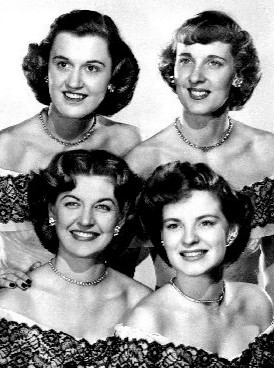
"Unchained Melody" is a 1955 song with music by Alex North and lyrics by Hy Zaret. North wrote the music as a theme for the prison film Unchained (1955), hence the song title. Todd Duncan sang the vocals for the film soundtrack. It has since become a standard and one of the most recorded songs of the 20th century, most notably by the Righteous Brothers in 1965. According to the song's publishing administrator, over 1,500 recordings of "Unchained Melody" have been made by more than 670 artists, in multiple languages.

The Chordettes were an American female vocal quartet, specializing in traditional pop music. They are best known for their 1950s hit songs "Mr. Sandman" and "Lollipop".
Cadence Records was an American record company based in New York City whose labels had a picture of a metronome. It was founded by Archie Bleyer, who had been the musical director and orchestra leader for Arthur Godfrey in 1952. Cadence also launched a short-lived jazz subsidiary, Candid Records.
Archibald Martin Bleyer was an American song arranger, bandleader, and record company executive.
"If I Give My Heart to You" is a popular song written by Jimmy Brewster, Jimmie Crane, and Al Jacobs. The most popular versions of the song were recorded by Doris Day and by Denise Lor; both charted in 1954.

"Mr. Sandman" is a popular song written by Pat Ballard and published in 1954. It was first recorded in May of that year by Vaughn Monroe & His Orchestra and later that year by The Chordettes and the Four Aces. The song's lyrics convey a request to "Mr. Sandman" to "bring me a dream" – the traditional association of the folkloric figure. The pronoun used to refer to the desired dream is often changed depending on the sex of the singer or group performing the song, as the original sheet music publication, which includes male and female versions of the lyrics, intended.
"Let Me Go, Lover!", a popular song, was written by Jenny Lou Carson and Al Hill, a pen name used by Fred Wise, Kathleen Twomey, and Ben Weisman. It is based on an earlier song called "Let Me Go, Devil", about alcoholism.
"If (They Made Me a King)" is a popular song with music written by Tolchard Evans and the lyrics written by Robert Hargreaves and Stanley J. Damerell. The song was written in 1934, but the most popular versions were recorded in 1950–1951. Perry Como's version, recorded November 28, 1950, was a number-one hit on the Billboard charts for eight weeks. The Como version was released under the following labels and catalog numbers:
"Pledging My Love" is a blues ballad. It was written by Ferdinand Washington and Don Robey and published in 1954.
"My Bonnie Lassie" is a popular song, by Roy C. Bennett, Sid Tepper, and Marion McClurg.

"Melody of Love" is a popular song. The music was originally written by Hans Engelmann in 1903. The lyrics were added by Tom Glazer in 1954.
"Maladie d'Amour" is a popular folk tune of the French West Indies recorded for the first time in 1931 by Léona Gabriel but popularised in the arrangement by Henri Salvador published in 1949. The published lyrics of Marc Lanjean begin: "Maladie d’amour,/ Maladie des amoureux / Si tu n’aimes que moi / Reste tout près de moi". However Salvador himself often sang the song in French Creole with the lyrics "Maladi damour, Maladi dé zamoureu, Chacha si’w enmen-mwen, Wa maché dèyè-mwen", a tribute to a chacha, meaning an older woman sweet on a younger man.
"Young Love" is a popular song, written by Ric Cartey and Carole Joyner, and published in 1956. The original version was recorded by Ric Cartey with the Jiva-Tones on November 24, 1956. It was released in 1956 by Stars Records as catalog number 539 and one month later by RCA Records as catalog number 47-6751. Cartey's version never charted.
"Till Then" is a popular song written by Eddie Seiler, Sol Marcus, and Guy Wood and published in 1944.
"(I Love You) for Sentimental Reasons" is a popular song written by Ivory "Deek" Watson, founding member of the Ink Spots and of the Brown Dots, and William "Pat" Best, founding member of the Four Tunes.
"Someday You'll Want Me to Want You" is a popular song published in 1944 by Jimmie Hodges. The song became a standard, recorded by many pop and country music singers.

Andy Williams' Greatest Hits is a compilation album by American pop singer Andy Williams that was released in early 1970 by Columbia Records. It was not, however, as its title might suggest, strictly a hit singles compilation, although some of his biggest songs since joining Columbia were included. A couple of selections were never released as singles by Williams, and his signature song, "Moon River", was released in the 7-inch single format but only for jukeboxes. His six Cadence singles that made the Top 10 on Billboard magazine's Hot 100 are passed over for the inclusion of his number 11 hit from that label, "The Hawaiian Wedding Song", and 17 of his Columbia recordings that made the Hot 100 up until 1970 are left out here in favor of "Charade", which spent its one week on the chart at number 100.

The Village of St. Bernadette is the sixth studio album by American pop singer Andy Williams and was released in early 1960 by Cadence Records. It was described by Billboard magazine as "a lovely set of pop inspirational, hymns, and religious themes".

To You Sweetheart, Aloha is the fourth studio album by American pop singer Andy Williams and was released late in the summer of 1959 by Cadence Records. This, his fourth LP for the label, has a Hawaiian theme that coincides with the admission of the 50th of the United States.





